-
ORIGINAL ARTICLE09-20-2024
Predictor variables effect on the development of Burnout Syndrome in higher education professor
Revista Brasileira de Enfermagem. 2024;77(4):e20240132
Abstract
ORIGINAL ARTICLEPredictor variables effect on the development of Burnout Syndrome in higher education professor
Revista Brasileira de Enfermagem. 2024;77(4):e20240132
DOI 10.1590/0034-7167-2024-0132
Views0See moreABSTRACT
Objectives:
to correlate the development of Burnout Syndrome in higher education professors with the following variables: sociodemographic, economic, work, sleep pattern, level of anxiety and quality of life.
Methods:
observational, analytical, cross-sectional study with a quantitative approach. Data collection took place from August to November 2022, with 140 professors from a private higher education institution in the Western Brazilian Amazon.
Results:
professors who carried out activities outside institutional hours and who had sleep duration < 5 hours, presented lower scores in the personal fulfillment dimension of burnout, with (p=0.002) and (p=0.001), respectively. The higher the scores for the physical (p=0.001), psychological (p=0.000) and social relationships (p=0.002) domains of quality of life, the lower the personal fulfillment scores for the syndrome.
Conclusions:
through linear regression, it was evidenced that several variables explain the development of burnout. Institutional and governmental actions can minimize the negative influence of these variables.
-
ORIGINAL ARTICLE09-20-2024
Construction and enhancement of a prototype for a medical-hospital equipment for hypodermoclysis: a qualitative study
Revista Brasileira de Enfermagem. 2024;77(4):e20240059
Abstract
ORIGINAL ARTICLEConstruction and enhancement of a prototype for a medical-hospital equipment for hypodermoclysis: a qualitative study
Revista Brasileira de Enfermagem. 2024;77(4):e20240059
DOI 10.1590/0034-7167-2024-0059
Views0See moreABSTRACT
Objectives:
to construct a Subcutaneous Hydration Device semi-functional prototype and gather initial information to improve this prototype design and realize its acceptance potential.
Methods:
a qualitative, descriptive and exploratory study, which used focus group, following the Technology Acceptance Model. The group was held at the Escola Superior de Enfermagem de Coimbra, Portugal, in December 2022, composed of nine participants from six different disciplinary areas, and followed thematic analysis.
Results:
four topics emerged associated with the device components: elastomeric infusion pump; needle/access device; clamp; administration set. From these topics, topics were triggered that highlighted: characteristics about the target population; ease of use and accessories; patient comfort and safety; and device application context.
Final Considerations:
the Subcutaneous Hydration Device semi-functional prototype is viable and interesting for the clinic. The results support its improvement and direct future investments for experimental studies.

-
REVIEW09-20-2024
Brazilian nursing specific situation, middle and micro-range theories: a bibliometric study
Revista Brasileira de Enfermagem. 2024;77(4):e20230520
Abstract
REVIEWBrazilian nursing specific situation, middle and micro-range theories: a bibliometric study
Revista Brasileira de Enfermagem. 2024;77(4):e20230520
DOI 10.1590/0034-7167-2023-0520
Views0See moreABSTRACT
Objectives:
to map the nursing theories developed in stricto sensu graduate programs in nursing in Brazil.
Methods:
a bibliometric study, carried out on the Coordination for the Improvement of Higher Education Personnel Theses and Dissertations Portal in October 2023. The controlled descriptors “Nursing Theory” and “Nursing Models” and the uncontrolled descriptors “Theories” and “Middle-Range Theory” were used. Selected studies were cataloged for analysis, which was conducted by the study authors, who have a doctoral degree and expertise in research on nursing theories.
Results:
thirty-nine nursing theories were mapped, with a predominance of middle-range theories (79.5%), focusing on nursing diagnostic concepts and use of the theoretical-methodology strategy of theoretical-causal validity.
Conclusions:
the study identified nursing theories developed in Brazil, recognizing trends, development strategies, theorized objects of disciplinary interest and investments necessary for practical application in Brazilian contexts.

-
ORIGINAL ARTICLE09-20-2024
Cross-cultural adaptation and validation of the Healthy Work Environment Assessment Tool in Brazilian culture
Revista Brasileira de Enfermagem. 2024;77(4):e20230505
Abstract
ORIGINAL ARTICLECross-cultural adaptation and validation of the Healthy Work Environment Assessment Tool in Brazilian culture
Revista Brasileira de Enfermagem. 2024;77(4):e20230505
DOI 10.1590/0034-7167-2023-0505
Views0See moreABSTRACT
Objectives:
to adapt and validate the content of the Healthy Work Environment Assessment Tool for Brazilian culture, and evaluate the practical aspects of its application.
Methods:
methodological study that followed six stages: translation; synthesis; back translation; content validation by a group of experts, pre-testing and approval of the process by the author of the original instrument.
Results:
the first three stages were carried out by contracted companies. In the committee, two items and the title of a subscale were evaluated in a second round, when consensus was reached among experts. In the pre-test, more than 93% of professionals agreed that the tool was easy to understand. The average completion time was 8.53 minutes. The American Association of Critical-Care Nurses authorized publication of the results.
Conclusions:
the adaptation of the tool to Brazilian culture was completed following the adopted framework. In addition to the evidence of content validity, the tool appears promising for managerial use.
-
ORIGINAL ARTICLE09-20-2024
Construction and validation of a checklist for the management of totally implanted catheters in children
Revista Brasileira de Enfermagem. 2024;77(4):e20230447
Abstract
ORIGINAL ARTICLEConstruction and validation of a checklist for the management of totally implanted catheters in children
Revista Brasileira de Enfermagem. 2024;77(4):e20230447
DOI 10.1590/0034-7167-2023-0447
Views0See moreABSTRACT
Objectives:
to construct and validate the content of a checklist for the management of totally implanted catheters in hospitalized children and adolescents.
Methods:
methodological research conducted from October 2021 to December 2022 in two stages: development of the instrument with care guidelines and content validation of the checklist. The instrument, containing 23 items presented in Likert format, was evaluated online by specialists in two rounds. The Content Validity Index was applied, considering indices above 0.8 as valid.
Results:
the final checklist included four domains and 22 checklist items, validated with a Content Validity Index of 0.98. The overall evaluation of the instrument presented a global score of 9.9.
Conclusions:
the validation and application of instruments that standardize procedures, in addition to supporting professionals, promote autonomy and quality of care for children and adolescents using this device.

-
ORIGINAL ARTICLE09-20-2024
Transgender people’s knowledge about the adverse effects of cross-hormonization: challenges for nursing
Revista Brasileira de Enfermagem. 2024;77(4):e20230346
Abstract
ORIGINAL ARTICLETransgender people’s knowledge about the adverse effects of cross-hormonization: challenges for nursing
Revista Brasileira de Enfermagem. 2024;77(4):e20230346
DOI 10.1590/0034-7167-2023-0346
Views0See moreABSTRACT
Objectives:
to identify trans women’s and men’s knowledge about the adverse effects of cross-hormonization and understand the repercussions of hormonization practices on trans women’s and men’s health.
Methods:
exploratory, descriptive, qualitative research, developed with 41 participants, from July 2019 to February 2020, in a trans health outpatient clinic. Thematic-categorical content analysis was used.
Results:
from the analysis, the categories emerged: Knowledge about the adverse effects of cross-hormonization; and Cross-hormonization practices and their meaning.
Final Considerations:
nursing practices, based on the identification of knowledge about adverse effects and the understanding of cross-hormonization practices in trans women’s and men’s health, can result in more inclusive care.
-
ORIGINAL ARTICLE09-20-2024
Sociocognitive factors determining compliance with standard precautions by nursing professionals during the COVID-19 pandemic
Revista Brasileira de Enfermagem. 2024;77(4):e20230301
Abstract
ORIGINAL ARTICLESociocognitive factors determining compliance with standard precautions by nursing professionals during the COVID-19 pandemic
Revista Brasileira de Enfermagem. 2024;77(4):e20230301
DOI 10.1590/0034-7167-2023-0301
Views0See moreABSTRACT
Objectives:
to assess the socio-cognitive factors determining adherence to standard precautions by nursing professionals in care practice during the COVID-19 pandemic in Brazil.
Methods:
an analytical cross-sectional study, carried out with 9,039 nursing professionals in Brazil, using an electronic form containing participant sociodemographic, training and work variables, and the Brazilian version of the Standard Precautions Questionnaire. Descriptive and inferential statistics were used using the statistical software R.
Results:
participants recognize standard precautions as effective measures to reduce infections and report intention to perform them. Training regarding standard precautions was evidenced as a facilitator of adherence (4.72; SD: 0.73), and problems related to materials (3.78; SD: 1.45) were a hindrance.
Conclusions:
among the determining factors, facilitating organization presented the highest score, followed by intention to perform. Facilitating and hindering factor identification makes it possible to develop intervention strategies to strengthen patient safety and reduce occupational risks among professionals.
-
ORIGINAL ARTICLE09-20-2024
Middle-range theory of the existential dimension of being-in-the-world of chronic kidney disease: Grounded Theory
Revista Brasileira de Enfermagem. 2024;77(4):e20230152
Abstract
ORIGINAL ARTICLEMiddle-range theory of the existential dimension of being-in-the-world of chronic kidney disease: Grounded Theory
Revista Brasileira de Enfermagem. 2024;77(4):e20230152
DOI 10.1590/0034-7167-2023-0152
Views0See moreABSTRACT
Objectives:
to develop a middle-range theory of the existential dimension of being-in-the-world of chronic kidney disease in the light of humanistic nursing theory.
Methods:
exploratory-descriptive, qualitative, Grounded Theory study, whose guiding question was: what theoretical relationships can be established between clinical practice carried out in the context of renal replacement therapies and the concepts of humanistic nursing theory? Data were collected through semi-structured interviews with nursing staff and chronic kidney disease patients.
Results:
a theory was developed that describes and explains the existential dimension of being-in-the-world of chronic kidney disease, identifying the qualitative evidence present in this context.
Final Considerations:
the theory contributes to clinical nursing practice qualification in nephrology, consolidating nursing as an art and science, because it arises from care practice and research, in addition to rescuing what differentiates it within the health disciplines, which is care par excellence.

-
ORIGINAL ARTICLE07-29-2024
Evidence of validity of the Risk Self-Medication Questionnaire focused on Health Literacy
Revista Brasileira de Enfermagem. 2024;77(3):e20230386
Abstract
ORIGINAL ARTICLEEvidence of validity of the Risk Self-Medication Questionnaire focused on Health Literacy
Revista Brasileira de Enfermagem. 2024;77(3):e20230386
DOI 10.1590/0034-7167-2023-0386
Views0See moreABSTRACT
Objectives:
to analyze the validity evidence of the internal structure of the Risk Self-Medication Questionnaire Focused on Health Literacy.
Methods:
a psychometric study with 499 adults. The internal structure was assessed with exploratory and confirmatory factor analysis to prove the adjustment. Internal consistency was measured by composite reliability and McDonald’s omega coefficient (ω).
Results:
the parameters revealed a model of 35 items distributed across four factors, explaining 56% of the total variance, with factor loadings ranging from 0.31 to 0.85 and adequate communalities. Accuracy (0.79
Conclusions:
an instrument was obtained with good evidence of structural validity for measuring self-medication.
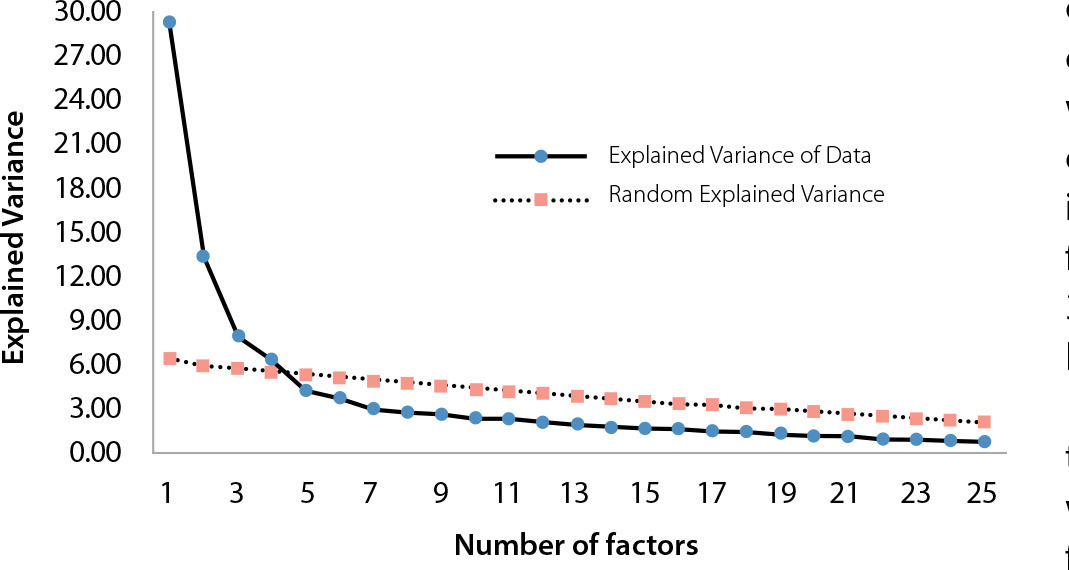
-
ORIGINAL ARTICLE07-29-2024
Nurses’ perspectives on nurses’ work methods
Revista Brasileira de Enfermagem. 2024;77(3):e20230374
Abstract
ORIGINAL ARTICLENurses’ perspectives on nurses’ work methods
Revista Brasileira de Enfermagem. 2024;77(3):e20230374
DOI 10.1590/0034-7167-2023-0374
Views0See moreABSTRACT
Objectives:
To analyze nurses’ perspectives on nurses’ work methods in the hospital context.
Methods:
A descriptive study with a qualitative approach was conducted in a hospital in northern Portugal, involving 17 nurses. Semi-structured interviews were used for data collection. Data collected between May and June 2023 underwent content analysis, supported by Atlas.ti software.
Results:
Three thematic areas emerged: “Nurses’ work methods in a hospital context,” highlighting the conception and components of work methods and the methods in use; “Implementation of nurses’ work methods,” emphasizing influencing factors and challenges to implementation; and “Impact of nurses’ work methods on patients, nurses, and institutions.”
Final Considerations:
Nurses’ work methods constitute the structure of nursing care. Some factors influence and some challenges arise in the implementation of these methods, producing impacts on patients, nurses, and institutions.

-
ORIGINAL ARTICLE07-29-2024
Nursing Process for institutionalized older adults: contributions from knowledge awareness workshop
Revista Brasileira de Enfermagem. 2024;77(3):e20230349
Abstract
ORIGINAL ARTICLENursing Process for institutionalized older adults: contributions from knowledge awareness workshop
Revista Brasileira de Enfermagem. 2024;77(3):e20230349
DOI 10.1590/0034-7167-2023-0349
Views0See moreABSTRACT
Objective:
To analyze the knowledge of professionals working in a Nursing Home about the Nursing Process before and after the awareness workshop.
Methods:
This is strategic action research, developed with nursing professionals and managers of a Nursing Home in Rio Grande do Sul, Brazil. Data were collected between January and June 2023, through semi-structured interviews before and after an awareness workshop. Discursive textual analysis of the data was carried out.
Results:
The central category “Understanding about the Nursing Process in Nursing Homes” emerged, which was unitized into two units of meaning and three categories of analysis.
Conclusion:
Data revealed non-use and lack of knowledge of the Nursing Process before awareness raising. Afterwards, a deeper understanding of the topic and its importance was identified. Awareness-raising workshops contribute to transformation of knowledge.
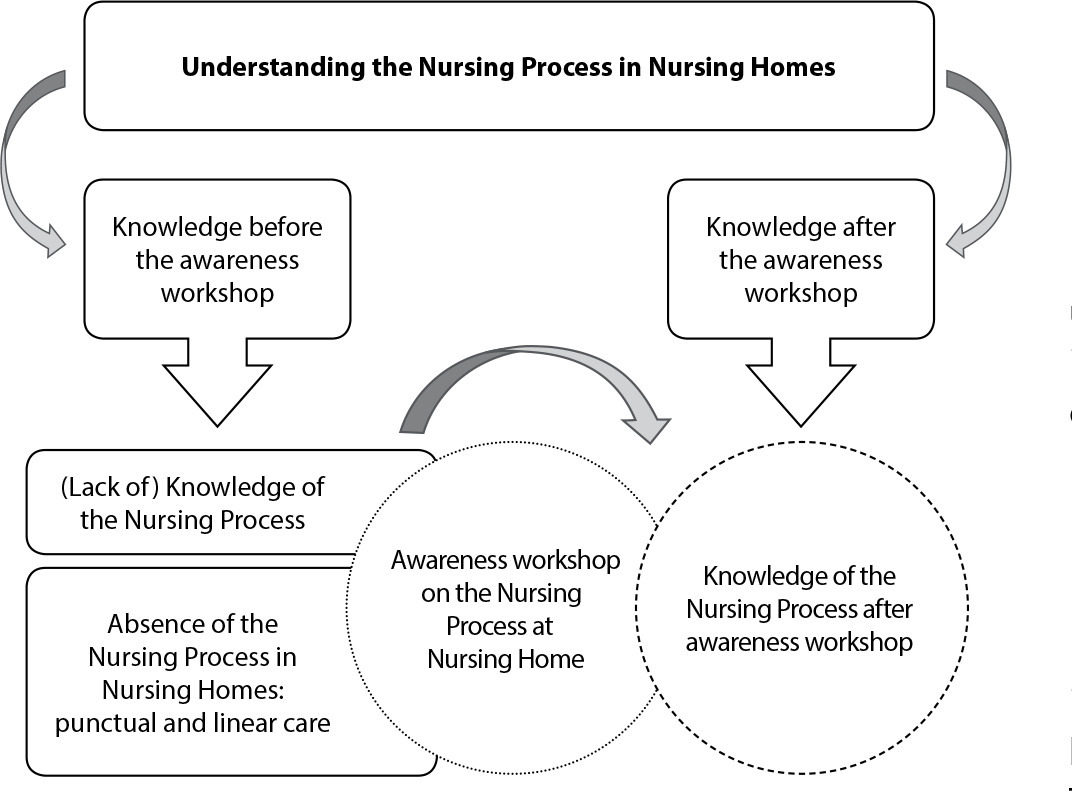
-
ORIGINAL ARTICLE07-29-2024
Excessive daytime sleepiness in nursing technicians: association with sleep quality and memory
Revista Brasileira de Enfermagem. 2024;77(3):e20230332
Abstract
ORIGINAL ARTICLEExcessive daytime sleepiness in nursing technicians: association with sleep quality and memory
Revista Brasileira de Enfermagem. 2024;77(3):e20230332
DOI 10.1590/0034-7167-2023-0332
Views0See moreABSTRACT
Objective:
to investigate excessive daytime sleepiness prevalence among nursing technicians and the association with sleep quality and memory.
Methods:
a cross-sectional, inferential study, carried out in a hospital unit in the state of Goiás between December 2020 and January 2021. Assessments were carried out using the Epworth Sleepiness Scale, the Pittsburgh Sleep Quality Index and the Prospective and Retrospective Memory Questionnaire, instruments validated for the Brazilian context. Bivariate and multivariate logistic regression analyzes were performed.
Results:
the sample consisted of 189 nursing technicians with a 40.9% excessive daytime sleepiness prevalence. In multivariate models, excessive daytime sleepiness was not associated with sleep quality, however there was a significant association with overall memory failures.
Conclusions:
study results demonstrate a high excessive daytime sleepiness occurrence, an association with overall memory failures and the need for psychosocial interventions for nursing technicians.
-
ORIGINAL ARTICLE07-29-2024
Educational technology for multidisciplinary training for managing waiting lists for elective patients
Revista Brasileira de Enfermagem. 2024;77(3):e20230299
Abstract
ORIGINAL ARTICLEEducational technology for multidisciplinary training for managing waiting lists for elective patients
Revista Brasileira de Enfermagem. 2024;77(3):e20230299
DOI 10.1590/0034-7167-2023-0299
Views1See moreABSTRACT
Objectives:
to construct and assess an educational technology for managing patient waiting lists for multidisciplinary training.
Methods:
study supported by Instructional Design – ADDIE model, whose stages of construction of educational technology were developed in the form of a multi-professional training course. Its respective content assessment was carried out by a committee of experts from 2021 to 2022. The analysis occurred based on the proportion of content adequacy with 95% Confidence Interval.
Results:
seventeen products were created as educational technology learning objects: five storyboards; four videos; three comic books; two pedagogical action plans; a mind map; and a YouTube® playlist. Nine experts assessed content adequacy, which reached 0.89.
Conclusions:
this educational technology contributes to the performance of professionals who manage waiting lists by reducing inequalities, alleviating differences, in addition to promoting equity in care and good health for patients in the Brazilian Health System.

-
ORIGINAL ARTICLE07-29-2024
Fuzzy Logic: vulnerability of women who have sex with women to sexually transmitted infections
Revista Brasileira de Enfermagem. 2024;77(3):e20230271
Abstract
ORIGINAL ARTICLEFuzzy Logic: vulnerability of women who have sex with women to sexually transmitted infections
Revista Brasileira de Enfermagem. 2024;77(3):e20230271
DOI 10.1590/0034-7167-2023-0271
Views0See moreABSTRACT
Objective:
To describe the possibility of applying Fuzzy Logic in analyzing the vulnerability of Women Who Have Sex with Women to Sexually Transmitted Infections/HIV/AIDS.
Methods:
We developed a Fuzzy Logic system with 17 input variables and one output variable, using data related to vulnerability in a municipality located in the Midwest region of the State of São Paulo, Brazil.
Results:
The factor with the greatest positive impact was the confirmation that a low understanding of Sexually Transmitted Infections/HIV/AIDS is associated with higher vulnerability. Conversely, the statement “Not disclosing sexual activity to healthcare professionals,” where individuals do not admit to having sex with women, had the least impact.
Conclusions:
Fuzzy Logic facilitates the identification of vulnerability, expressed through the analysis of interaction between variables in each dimension. This makes it a promising method to assist in analyzing the vulnerability of specific populations.
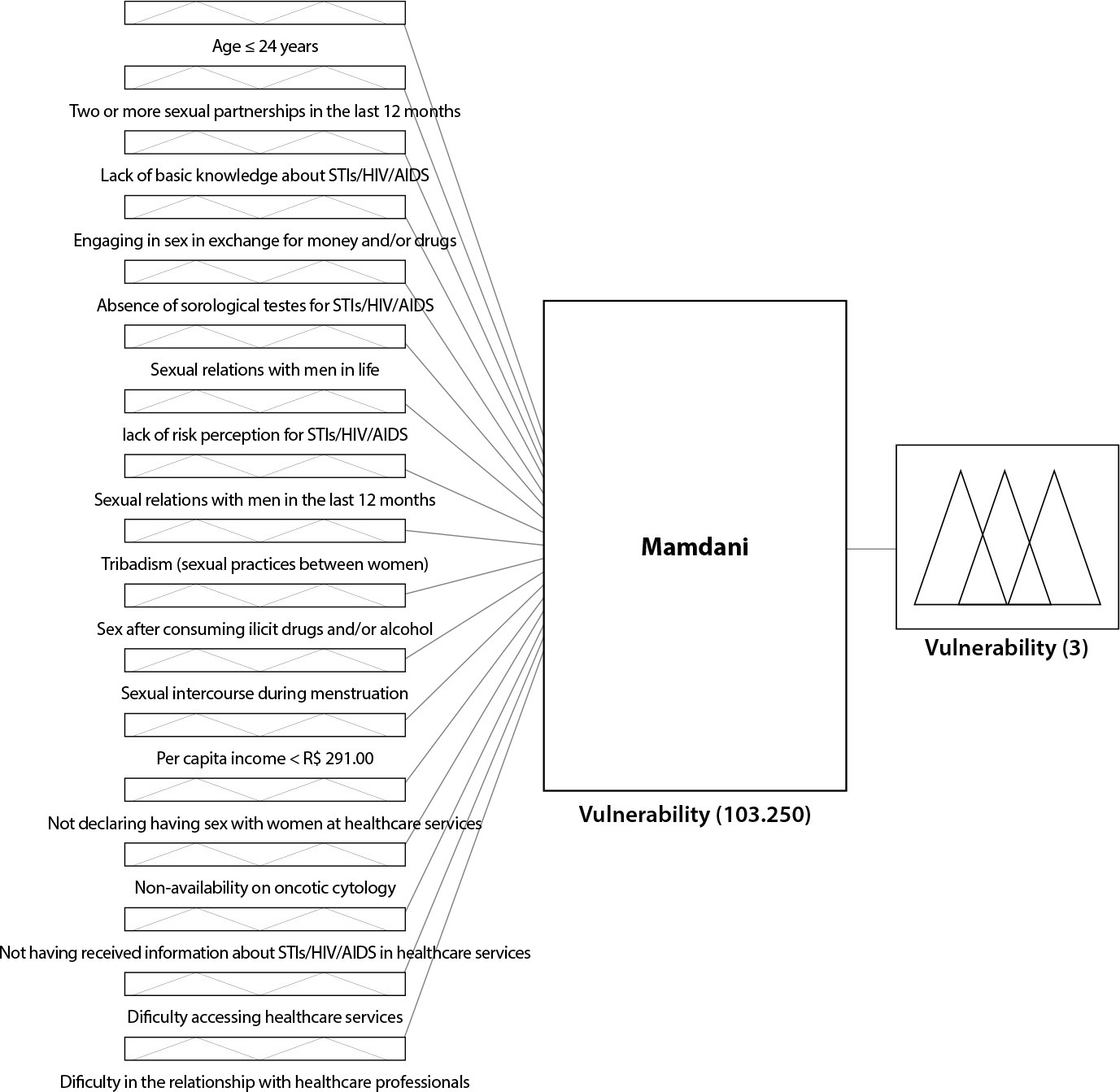
-
ORIGINAL ARTICLE07-29-2024
University Student Depression Inventory, Brazilian Version, Construct Assessment
Revista Brasileira de Enfermagem. 2024;77(3):e20230232
Abstract
ORIGINAL ARTICLEUniversity Student Depression Inventory, Brazilian Version, Construct Assessment
Revista Brasileira de Enfermagem. 2024;77(3):e20230232
DOI 10.1590/0034-7167-2023-0232
Views0See moreABSTRACT
Objectives:
to assess the University Student Depression Inventory, Brazilian version (USDI-BR), construct.
Methods:
a methodological study carried out with a snowball probabilistic sample, consisting of 334 undergraduate and graduate students. Confirmatory factor analysis, reliability using McDonald’s omega coefficient and Cronbach’s alpha were performed. Principal component analysis was performed using the varimax rotation and oblimin rotation, using the Kaiser-Meyer-Olkin criteria, Bartlett’s test of sphericity and scree plot.
Results:
the USDI-BR presented an internal consistency of items of ω = 0.95 and remained with 30 items, with the addition of 1 factor (Death wish and social withdrawal), totaling 4 factors.
Conclusions:
the USDI-BR has evidence that points to its validity and also its internal consistency, deserving that new studies be carried out to expand the evidence of its psychometric properties.
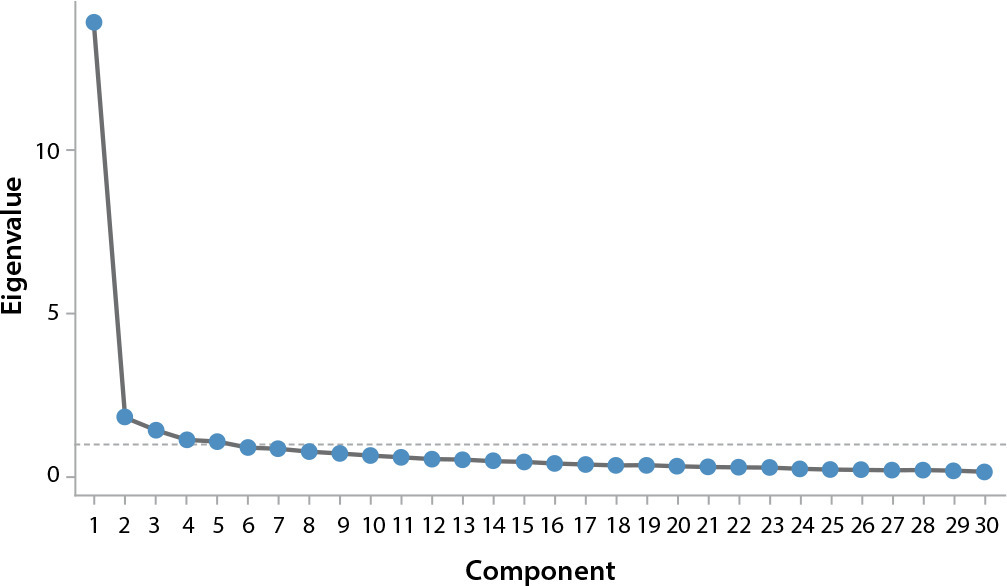
-
ORIGINAL ARTICLE07-29-2024
Family refusal of skin donation for transplantation: trends and associated factors
Revista Brasileira de Enfermagem. 2024;77(3):e20230209
Abstract
ORIGINAL ARTICLEFamily refusal of skin donation for transplantation: trends and associated factors
Revista Brasileira de Enfermagem. 2024;77(3):e20230209
DOI 10.1590/0034-7167-2023-0209
Views0See moreABSTRACT
Objectives:
to analyze the trends and factors associated with family refusal of skin donation for transplantation.
Methods:
this cross-sectional study was conducted in the State of São Paulo, with family authorization terms collected from 2001 to 2020. The variables analyzed included year, age, gender, cause of death, and type of institution. Data were analyzed using linear and multiple logistic regression, with the Odds Ratio estimated at p<0.05 for statistical significance.
Results:
1,355 individuals refused skin donation. The trend of refusals decreased between 2001 and 2009 in the age groups of 0-11 years and 12-19 years, but increased in the group aged ≥60 years. This trend continued to decrease in the 0-11 years group from 2010 to 2020, and increased in the 20-40 years group. Males and the age groups of 20-40 years, 41-59 years, and ≥60 years exhibited 27%, 34%, 47%, and 53% lower chances of refusal, respectively.
Conclusions:
there is an urgent need for measures to mitigate the high number of refusals associated with skin donation.
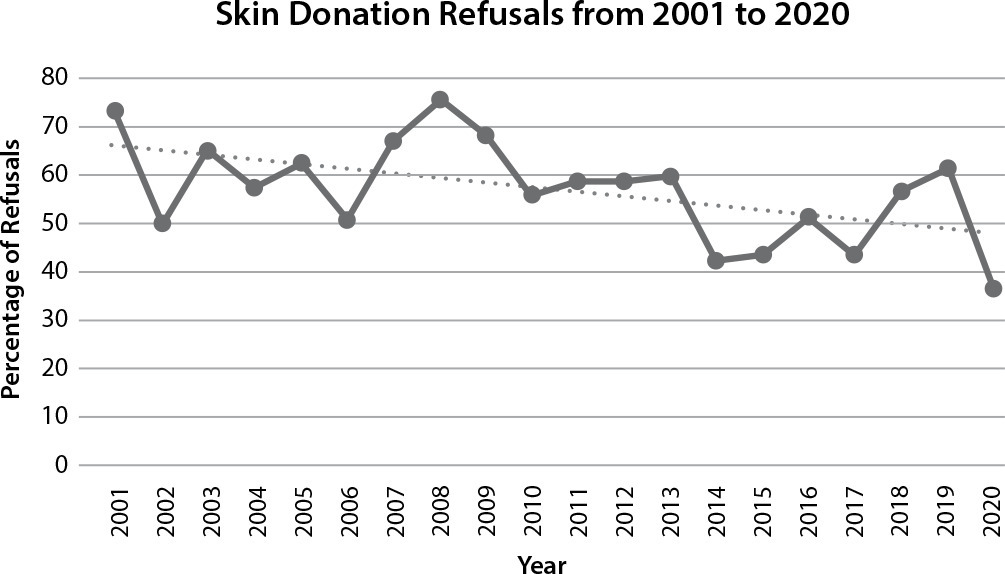
-
ORIGINAL ARTICLE05-29-2023
Risk of violence and frailty syndrome among older adults treated at a hospital service
Revista Brasileira de Enfermagem. 2023;76:e20220278
Abstract
ORIGINAL ARTICLERisk of violence and frailty syndrome among older adults treated at a hospital service
Revista Brasileira de Enfermagem. 2023;76:e20220278
DOI 10.1590/0034-7167-2022-0278
Views0See moreABSTRACT
Objectives:
to assess the association between risk of violence and frailty syndrome among hospitalized older adults.
Methods:
quantitative, analytical and cross-sectional research, carried out with older adults in two university hospitals. Data collection was performed using the Brazil Old Age Schedule, Hwalek-Sengstock Elder Abuse Screening Test and Edmonton Frail Scale instruments. It was analyzed using descriptive statistics and inferential statistics.
Results:
risk of violence was higher among women (68.9%), over 70 years old (64.7%), with more than 3 years of study (68.9%), without relationship (67.1%), who do not work (65.1%) and with income above 1 minimum wage (65.2%). There is a significant association between risk of violence and frailty (72.3%; p<0.001) and a positive correlation between the instrument scores (r=0.350; p-value<0.001).
Conclusions:
risk of violence was associated with being female and frailty. The study is expected to encourage further discussions related to the theme and nursing practice.
-
ORIGINAL ARTICLE05-29-2023
Quality of life from women’s perspective in the exercise of sex work: a study of social representations
Revista Brasileira de Enfermagem. 2023;76:e20220169
Abstract
ORIGINAL ARTICLEQuality of life from women’s perspective in the exercise of sex work: a study of social representations
Revista Brasileira de Enfermagem. 2023;76:e20220169
DOI 10.1590/0034-7167-2022-0169
Views0See moreABSTRACT
Objectives:
to analyze the social representations elaborated by sex workers from Alto Sertão Produtivo Baiano about quality of life.
Methods:
a qualitative study, based on the Social Representation Theory, carried out in the region of Alto Sertão Produtivo Baiano, with 30 sex workers. Individual in-depth interview was carried out, with speeches organized in a corpus and treated in IRAMUTEQ, enabling lexical analysis for Descending Hierarchical Classification.
Results:
four thematic classes emerged, in which social representations of quality of life pervade: money earned to supply needs; association with healthy living and obtaining health (physical and mental); balance of emotions (although there are some negative sensations such as fear and anxiety); and faith in a deity.
Final Considerations:
the social representations elaborated by sex workers about quality of life are anchored in concepts, subjective and practical, punctuated by the World Health Organization.

-
05-29-2023
Absenteeism in child health services: a systematic review
Revista Brasileira de Enfermagem. 2023;76:e20210805
Abstract
Absenteeism in child health services: a systematic review
Revista Brasileira de Enfermagem. 2023;76:e20210805
DOI 10.1590/0034-7167-2021-0805
Views0See moreABSTRACT
Objectives:
to analyze data from qualitative studies related to the phenomenon of health follow-up dropout of newborns, infants and preschoolers in child health services.
Methods:
systematic review, carried out in 19 information bases. Studies were included that portray the reasons for dropping out health follow-up of children up to five years old. The JBI methodology was used for systematic reviews of qualitative evidence.
Results:
we identified 20,199 studies. After applying the eligibility criteria, 81 were selected. Seven were excluded due to duplicity, resulting in 74 articles that were read in full. After this phase, three articles were selected for the final sample and later after reading their references, one more was included, totaling four articles for critical analysis.
Conclusions:
the synthesized findings highlight that health follow-up dropout is based on personal knowledge and beliefs, the family routine dynamics and access to services.

-
ORIGINAL ARTICLE05-12-2023
Preceptorship contributions to the development of clinical and managerial skills in nursing residency
Revista Brasileira de Enfermagem. 2023;76(2):e20220510
Abstract
ORIGINAL ARTICLEPreceptorship contributions to the development of clinical and managerial skills in nursing residency
Revista Brasileira de Enfermagem. 2023;76(2):e20220510
DOI 10.1590/0034-7167-2022-0510
Views0See moreABSTRACT
Objectives:
to analyze the experience of resident nurses with preceptorship contributions to the development of common clinical and managerial skills acquired in pedagogical projects.
Methods:
exploratory qualitative research developed in two stages: document analysis of pedagogical projects and semi-structured interviews with residents. Content analysis was carried out based on the framework of the nurse’s work process and skills.
Results:
the pedagogical projects of the three programs foresee the development of common skills, mostly clinical and only two managerial skills. The 22 residents reported the contributions of preceptorship in the development of competences centered on clinical practice, focusing on technical procedures disjointed from clinical reasoning and the managerial dimension of the nurse’s work.
Final Considerations:
it is necessary to train preceptors and involve all social actors linked to residency programs to expand preceptorship potential.
-
ORIGINAL ARTICLE05-12-2023
Humanized care in the Intensive Care Unit: discourse of Angolan nursing professionals
Revista Brasileira de Enfermagem. 2023;76(2):e20220474
Abstract
ORIGINAL ARTICLEHumanized care in the Intensive Care Unit: discourse of Angolan nursing professionals
Revista Brasileira de Enfermagem. 2023;76(2):e20220474
DOI 10.1590/0034-7167-2022-0474
Views0See moreABSTRACT
Objectives:
to analyze the perception of nursing professionals in an intensive care unit in Angola about humanized care and identify resources necessary for its implementation.
Methods:
a qualitative, descriptive study conducted with 15 professionals in June-October/2020 in intensive care unit in Angola. The data were collected through semi-structured interviews; analysis based on the collective subject discourse technique.
Results:
five central ideas emerged: three related to the perception of humanized care (“From integral vision and empathy to a set of actions in all phases of care”, “Humanizing is extending care to family members and companions”, “Humanized care requires the establishment of a bond of trust and guarantee of individualized care”); and two on the resources necessary for this care (“Need for infrastructure – human and material resources”, “Professional training and humanized care are interconnected”).
Final Considerations:
humanized care involves objectivity and subjectivity; it includes family members. An adequate infrastructure can provide it.
-
ORIGINAL ARTICLE05-12-2023
The history of obstetric nurses’ professional training of in Minas Gerais (1957-1999): a genealogical analysis
Revista Brasileira de Enfermagem. 2023;76(2):e20220459
Abstract
ORIGINAL ARTICLEThe history of obstetric nurses’ professional training of in Minas Gerais (1957-1999): a genealogical analysis
Revista Brasileira de Enfermagem. 2023;76(2):e20220459
DOI 10.1590/0034-7167-2022-0459
Views0See moreABSTRACT
Objectives:
to analyze obstetric nurses’ professional training in Minas Gerais between 1957 and 1999, according to genealogical principles.
Methods:
a qualitative interpretative study based on historical research with genealogical analysis. Data were obtained through documentary research and oral history, with six participants, and submitted to discourse analysis.
Results:
they recompose the genealogical path of obstetric nurses’ professional training from Minas. The speeches reveal field of practice deprivation in professional training and the importance of the articulation between the Universidade Federal de Minas Gerais Nursing School and Hospital Sofia Feldman for teaching and work in obstetric nursing. It was identified that training, in the national scenario, evolved from a Escola de Enfermagem Carlos Chagas’ peripheral initiative to centrality and capillarity.
Final Considerations:
the unique historical trajectory of obstetric nurses’ professional training in Minas Gerais, marked by ruptures, institutional articulations, conflicting games and interest, was unveiled.
-
05-08-2023
Efectividad del Programa educativo de autorregulación en incrementar conocimientos sobre COVID-19 en militares peruanos
Revista Brasileira de Enfermagem. 2023;76:e20220498
Abstract
Efectividad del Programa educativo de autorregulación en incrementar conocimientos sobre COVID-19 en militares peruanos
Revista Brasileira de Enfermagem. 2023;76:e20220498
DOI 10.1590/0034-7167-2022-0498es
Views0See moreRESUMEN
Objetivo:
Determinar la efectividad del Programa educativo basado en autorregulación del aprendizaje en el nivel de conocimiento sobre COVID-19 en militares.
Métodos:
Estudio preexperimental de diseño pretest y postest con un solo grupo, realizado en 2020. Participaron 179 militares de Puno, Perú. Se desarrollaron dos sesiones expositivo-participativas y un taller demostrativo. Se empleó un cuestionario válido (V de Aiken = 0,69) y confiable (Omega de McDonald = 0,81). Se utilizó el test de Friedman para comparar los resultados en pre y postest.
Resultados:
El nivel de conocimientos sobre COVID-19 y en dos de sus dimensiones cambió de deficiente (pretest) a regular (postest). Sin embargo, en la dimensión medidas preventivas, cambió de deficiente (pretest) a excelente (postest).
Conclusión:
La intervención educativa propuesta fue efectiva al incrementar los conocimientos sobre COVID-19 en militares, principalmente en cuanto a medidas preventivas.

-
ORIGINAL ARTICLE05-08-2023
Effectiveness of the self-regulation educational program in increasing knowledge about COVID-19 in Peruvian soldiers
Revista Brasileira de Enfermagem. 2023;76:e20220498
Abstract
ORIGINAL ARTICLEEffectiveness of the self-regulation educational program in increasing knowledge about COVID-19 in Peruvian soldiers
Revista Brasileira de Enfermagem. 2023;76:e20220498
DOI 10.1590/0034-7167-2022-0498
Views0See moreABSTRACT
Objective:
To determine the effectiveness of the educational program based on self-regulation of learning in the level of knowledge about COVID-19 in the soldiers.
Methods:
Pre-experimental study with a pre-test and post-test design with a single group, carried out in 2020. 179 soldiers from Puno, Peru participated. Two expository-participatory sessions and a demonstrative workshop were developed. A valid (Aiken’s V = 0.69) and reliable (McDonald’s Omega = 0.81) questionnaire was used. The Friedman’s test was used to compare the results pre and post-test.
Results:
The level of knowledge about COVID-19 and in two of its dimensions changed from poor (pre-test) to regular (post-test). However, in the preventive measures dimension, it changed from poor (pre-test) to excellent (post-test).
Conclusion:
The proposed educational intervention was effective in increasing knowledge about COVID-19 in the soldiers, mainly in terms of preventive measures.

Search
Search in:
Nuvem de Tags
Adolescente (85) Atenção Primária à Saúde (239) COVID-19 (91) Criança (91) Cuidados de Enfermagem (269) Educação em Enfermagem (151) Educação em Saúde (139) Enfermagem (930) Enfermagem Pediátrica (86) Estudantes de Enfermagem (77) Estudos de Validação (131) Família (87) Idoso (208) Promoção da Saúde (99) Qualidade de Vida (104) Saúde do Trabalhador (86) Saúde Mental (145) Saúde Pública (82) Segurança do Paciente (150) Tecnologia Educacional (100)



